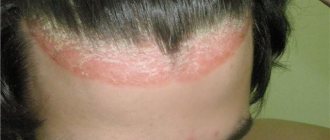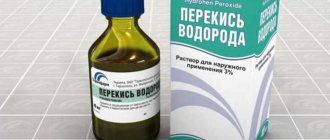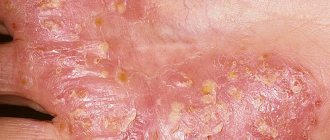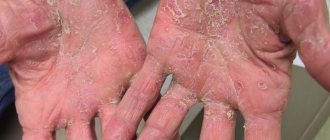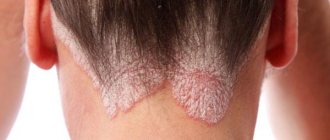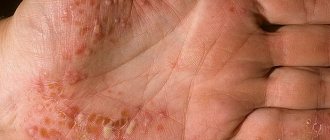Psoriasis, as you know, is a chronic disease of a non-infectious nature, which is accompanied by damage to the skin, nails, and sometimes joints. External manifestations of the disease cause a lot of physical as well as aesthetic discomfort and therefore negatively affect the quality of life. There are many medications and therapeutic methods designed to eliminate or reduce psoriatic symptoms. Sometimes they involve the use of strong hormonal drugs. Many people prefer gentler topical products. One of them is solidol for psoriasis, which is used in its pure form, in the form of finished medications or as part of self-prepared ointments.
Treatment of psoriasis with solidol is a fairly popular method, and although it requires a fairly long period of use, in the end many people got rid of plaques and achieved long-term remission with its help.
Causes and signs of the disease
Psoriasis is not difficult to recognize. Already in the first stages of its development, it clearly manifests itself thanks to characteristic skin rashes - inflamed, convex spots with a heterogeneous relief of a reddish-pink color, which significantly rise above the healthy epidermis.
Such loose elements, moreover, are abundantly strewn with silver-gray scales (even with minor mechanical stress they peel off easily). The skin rashes characteristic of psoriasis are called psoriatic plaques.
The spread of the rash throughout the body is associated with a lot of unpleasant physical sensations and psycho-emotional discomfort.
Thus, patients with the appropriate diagnosis suffer from unbearable itching, peeling, pain in the affected areas, and also encounter such general signs of psoriasis as dizziness, apathy, decreased ability to work, neuroses, depression, attacks of unmotivated aggression, and during exacerbation of the pathology - increased temperature bodies.
In addition, psoriasis has long ceased to be just a medical problem: it is a real socio-psychological disaster. Patients, unable to come to terms with the “renewed” appearance of once healthy skin, become withdrawn, asocial, develop complexes and break off most of their communications. That is why patients with psoriasis require the help of not only a qualified dermatologist, but also an experienced psychotherapist.
It is noteworthy that, despite the existence of a mass of scientific works devoted to psoriasis, its nature has not been fully studied - this disease is included in the list of those that have an unclear etiology. Of course, medical scientists put forward a number of versions that interpret the appearance of psoriatic plaques from one point of view or another. The most popular and reliable theory of the origin of psoriasis today is considered to be autoimmune. Its main postulate is this: the occurrence of characteristic rashes on the skin is a consequence of a hypertrophied attack by the body’s defenses on healthy epidermal cells, intensive growth and active reproduction of such cells.
Other versions explaining the etiology of psoriasis include:
- Neurogenic (stressful);
- Viral;
- Metabolic (exchange);
- Endocrine (hormonal);
- Medicinal;
- Allergic;
- Toxic.
Unfortunately, all of these approaches to understanding the essence of psoriasis are only assumptions that are not officially recognized by modern medical science.
Psoriasis is a hereditary disease.
Thus, in 70-75% of clinical cases, those whose relatives are already sick can become the “lucky owners” of psoriatic plaques. The disease can signal its appearance at any age after an illness (viral or infectious etiology), against the background of stress or hormonal changes in the body, as well as during prolonged drug therapy (for example, antibiotics). It is believed that not only the disease itself can be inherited, but even the tendency to develop it.
The lack of reliable information about the nature of psoriasis determines the fact that there is still no single standard treatment regimen for this disease that could relieve patients with psoriatic plaques from these rashes once and for all. All therapeutic measures that are practiced for psoriasis are symptomatic and are designed to cope with the inflammatory process on the skin, minimize local discomfort created by rash elements, and also prevent further proliferation of plaques.
For what skin diseases is solidol used and how?
Medical solid oil is actively used to treat a wide variety of dermatological pathologies. Most often this drug is used to treat the following diseases, namely:
Psoriasis
This autoimmune disease of the upper layer of the skin, leading to loss of its functionality, covers the body with red spots that flake and itch severely throughout the day. Solidol helps reduce itching, prevents the disease from occupying new, still healthy areas of the skin, relieves the inflammatory process, and also reduces the intensity of peeling of dead epithelial particles.
Atopic dermatitis
Medical solid oil stops the focus of dermatological damage and gradually completely eliminates the symptoms of the disease. Thanks to this, most patients with this diagnosis do not use hormonal drugs and are able to maintain the health of the endocrine system.
Allergy
The manifestation of an allergic reaction to external and internal irritants can be very diverse and sometimes even unpredictable. These are skin rashes of an allergic type. Then pimples and red spots form on the skin, which itch and hurt. Applying an even layer of medical grease to the skin soothes the inflamed epidermal tissue and helps the patient to withstand the manifestation of allergies with dignity. The effect is enhanced several times if the patient, at the same time as treating allergic foci with solid oil, also takes antihistamines orally.
Neurodermatitis
One of the most complex dermatological pathologies from the point of view of the impact of traditional medications on it. The disease occurs as a result of systemic dysfunction of the central and peripheral nervous systems. The patient experiences constant itching of the skin, constantly scratching the same areas until wounds and severe irritation form on the skin. Subsequently, inflammation occurs and the clinical picture of neurodermatitis looks very impressive. Medical solid oil helps to avoid all these negative consequences due to the fact that its constant use reduces the skin irritation factor and eliminates the feeling of itching.
Eczema
This disease can be infectious or parasitic in origin. Regardless of the type of pathology, solid oil shows the same effectiveness and contributes to the patient’s rapid recovery. Of course, for such ailments, the ointment should be used as an auxiliary element in complex therapy. First of all, the patient must get rid of the infectious pathogen that destroys the skin surface, or parasitic life forms (scabies mite).
If necessary and therapeutically appropriate, solidol can be used as a primary or additional agent in the treatment of other dermatological diseases. This is already determined by the attending physician based on the indicators of the tests performed and the external clinical picture of the disease. Solid oil is applied in an even layer over the entire surface of the diseased area of skin, covering the edges of healthy epidermal tissue.
In most cases, it is recommended to apply the ointment in the morning and evening after taking water procedures so that the skin is cleansed of dirt and grease.
An effective remedy for psoriasis
Treatment of psoriasis is complex and symptomatic. Thus, for patients with the appropriate diagnosis, systemic and local drugs of various spectrums of action are selected, effective physiotherapeutic procedures are prescribed, and a diet is prepared. General therapy is supplemented with proven folk recipes - decoctions, infusions, tinctures based on medicinal plants.
Ointments based on grease for psoriasis deserve special attention - they can be ready-made (sold in pharmacies) or prepared independently at home.
Solidol is a grease that is produced by thickening industrial oils of moderate viscosity with calcium soaps of higher fatty acids.
Externally, solid oil is a homogeneous composition without lumps of a light yellow or brown tint. This mass is difficult to wash off with water.
Solid oil contains the following components:
- Soap (11-18%);
- Free alkali (0.2%);
- Water (2-3%).
There are 3 main types of solid oils:
- Fatty – they are obtained as a result of thickening vegetable oils with fatty acids;
- Synthetic – produced using synthetic fatty acids;
- Medical - serve as the basis for medicinal ointments for psoriasis or other dermatological diseases, and are actively used in the pharmacological industry.
Any grease-based ointment for psoriasis has pronounced keratolytic (exfoliating) properties, effectively copes with the inflammatory process, peeling and itching of the skin, triggers natural mechanisms for renewing healthy epidermal cells, and ensures rapid healing of wounds.
It is necessary to understand that grease-based ointments for psoriasis work slowly and rather provide a cumulative effect. At the same time, they should be used in courses - an overdose of solid oil ointment for psoriasis is fraught with side effects, in addition. This drug is addictive .
Psoriasis goes away instantly if you apply regular...
Read more
Psoriasis is cured instantly! need to smear the skin...
Read more
Efficacy of the substance
Solidol is one of the most effective components in the treatment of psoriasis of any form. Preparations based on it have a good therapeutic effect and quickly penetrate into the deep layers of the epidermis, eliminating the causative agent of the disease.
The substance is obtained by combining mineral oils with calcium salts. The result of this process is the formation of a thick component.
Solid oils are medical, fatty and synthetic. The first type of product is used for medicinal purposes.
The effectiveness of the product in the fight against skin disease is confirmed by the following facts:
- the first result becomes noticeable after 7-10 days;
- minimal risk of an allergic reaction;
- Solid oil products can be applied to any area of the skin.
Ready-made effective formulations
Let's look at what pharmaceutical ointments based on solid oil exist for psoriasis:
- Antispor . An effective composition that, in addition to the main active component, contains petroleum jelly, as well as extracts of birch, string, celandine and calendula. It is necessary to use this ointment for psoriasis on grease twice a day for a month - it provides an anti-inflammatory, wound-healing, exfoliating effect.
- Cytospor . Non-hormonal ointment based on solid oil for psoriasis, used to combat the symptoms of the disease of all forms and stages.
- Akrustal . Non-hormonal safe hypoallergenic ointment based on grease for psoriasis with various plant extracts, beeswax and honey in the composition. This medicine can be used both for the treatment and prevention of psoriasis. It is not addictive, there are practically no side effects. How to use: the medicinal composition is applied to skin previously cleansed of fat, cosmetics and impurities with gentle massage movements 1-3 times a day. It is noteworthy that Akrustal is even approved to combat the symptoms of psoriasis in pregnant and lactating women.
- Rybakov's ointment based on solid oil for psoriasis. An affordable, effective systemic pharmaceutical product.
- Pikladon . Effective composition with grease, salicylic acid, birch tar, plant extracts and essential oils.
- Kartalin . Solid oil ointment for psoriasis, which also contains extracts of medicinal herbs and vitamin A. This pharmaceutical preparation for external use provides a high-quality anti-inflammatory effect and promotes rapid regeneration of damaged epidermal cells.
- Magnipsor . A remedy for psoriasis with solid oil, mineral supplements, essential oils, and medicinal plant extracts.
- Ungwetol . An effective composition based on fatty grease, sunflower oil, boric and benzoic acids, resorcinol, menthol. This drug demonstrates a pronounced fungicidal and antimicrobial effect. Apply to areas affected by psoriasis twice a day until the symptoms of the disease disappear.
- Chernyshev ointment . The medicine is based on baby cream, grease, extracts of celandine, calendula, string, Japanese sophora, and aloe juice. How to use the product: apply a thin, uniform layer of ointment to the loose elements, wrap in waxed paper, and bandage. After a day, the compress is removed.
- Psorium . An effective protective and prophylactic agent. Fat base – grease, lanolin, vegetable oils. Active components are extracts of medicinal plants (calendula, yarrow, chamomile, rose hips). This ointment for psoriasis has an antitoxic, anti-inflammatory, antibacterial, wound-healing effect on the skin, triggers regeneration mechanisms of epidermal cells in the affected areas, improves blood circulation and local metabolic processes. Method of use of the drug: apply the ointment to the affected areas of the skin once a day, leave for 8 hours. The course of treatment can last from 20 to 90 days.
- Psorilam . An effective composition for psoriasis based on grease, lanolin, boric and salicylic acids, vitamin A, zinc pyrithione, stearin. This cream-balm copes with itching and flaking of the skin, demonstrates a drying, antiseptic, and soothing effect.
- Psori cream . An ointment based on tar, naphthalan oil, petroleum jelly, lanolin, grease, mint and sea buckthorn oils, extracts of licorice, string, eucalyptus, sage. Apply twice a day to previously cleansed dry skin.
Home remedies
Effective ointments based on solid oil can be prepared at home yourself. Let's look at a few useful recipes:
- 100 g of solid oil (pre-purified) is mixed with 50 g of unrefined olive oil, the same amount of pharmaceutical alcohol tincture of Eleutherococcus, 100 g of honey and 10 g of beeswax. Add 1 raw chicken egg yolk to the resulting composition. All of these ingredients are mixed in an enamel bowl, sent to a water bath, and boiled until the mass thickens. The resulting product is cooled and stored in the refrigerator. How to use the ointment: Apply to psoriatic plaques three times a day.
- 100 g of solid oil (pre-purified) are combined with 3 tablespoons of honey, and 1 tbsp is added to them. l. onion and garlic juice, 2 tbsp. l. rose hip powder, 1 tsp. sulfur and egg white. All components of the ointment, in addition to grease, are thoroughly mixed in a blender until a mass of homogeneous consistency is obtained. When ready, add grease to the mixture and mix. Directions for use: homemade ointment is applied to skin lesions of psoriasis two hours before bedtime every day. It is recommended to store the medicine in the refrigerator.
- Dry, pre-crushed elecampane root (4 tbsp) is poured with 100 ml of water and placed in a water bath for 15 minutes. When the decoction is ready, solid oil is added, the composition is thoroughly mixed and applied to the skin affected by psoriasis for 1 hour. Wash off the product with tar, laundry or regular baby soap.
- Combine 25 g of ash from oak bark and rosehip branches, add 100 g of grease to them. 10 g of pharmaceutical alcohol tincture of celandine, 1 egg white. The composition must be left for 14 days in a cool, dark place, after which it is applied to the affected epidermis three times a day.
What is better to choose
Actually, the compositions are very similar to each other, but SOLIDOL is still an outdated composition that will sooner or later leave the market. Now I would like to summarize briefly, in which I will list several points for LITOL, so:
- Where is this lubricant most often used? Everything is correct for “stuffing” the boots of ball and steering ends. They do not heat up much during operation, a maximum of 50-55 degrees Celsius (that is, both compositions seem to be suitable). However, anthers are often made using new technologies, adding silicone and plastic. SOLIDOL will corrode the whole thing, thereby reducing the service life of the tips.
- Further, where else this thick composition is used, for “stuffing” CV joint boots, we again use LITOL because it does not corrode rubber and silicone materials at all.
- Wheel bearings. Grease is also used here, but the use of SOLIDOL is not possible here for two reasons. These are high temperatures (the hub can often heat up over 100 degrees Celsius), and mechanical loads (LITOL is more resistant to them).
- Steering rack. Well, the last one is the use in a rack, without power steering. Here you need to lubricate the meshing area of the gear and shaft. Here, again, there are no high temperatures, but there are rubber (silicone) boots, as well as plastic guide bushings. To prevent them from “corroding”, you need to use a newer composition
Actually, that’s all, as you can see, there is not even a question of what is better to use, there is a newer and more advanced type of lubricant and this is definitely LITOL, this is what you need to use in your car, and the difference in price between the old and new substance is not so big .
Treatment results
The clinical effect of using pharmaceutical and homemade ointments with grease is as follows:
- The intensity of skin peeling in areas affected by psoriasis is reduced;
- The indispensable companions of the disease - burning, itching, pain - go away;
- The area affected by psoriatic plaques decreases;
- The process of epithelialization of affected skin lesions is accelerated;
- The mechanism of healthy horn formation on eroded and ulcerated surfaces is intensified (due to the keratoplastic properties of solid oil).
Solidol is a substance that can cause allergic symptoms on the skin.
To avoid such an unpleasant side effect, before starting treatment you should apply a small amount of the product to the forearm area. If no local reaction is observed over the next 30 minutes, you can safely treat the psoriasis lesions with the medicinal composition.
Contraindications
Solidol is a very effective remedy, but there are some contraindications to its use. These include:
- hypersensitivity to ointment components;
- pregnancy;
- lactation period.
The last two points can be excluded, provided that your doctor has approved the use of the products. Solidol is a non-toxic product and rarely causes allergic reactions.
Like any component, solid oil has contraindications for use. It is strictly prohibited to use the medicine if you have an individual intolerance to the substance. If you ignore a possible allergy, there is a high risk of the following signs:
- nausea and vomiting;
- increased itching;
- the appearance of rashes on the body;
- headache.
The substance is used with caution during pregnancy and breastfeeding. You should definitely consult your doctor in advance. Only in this case will the therapy be safe.


